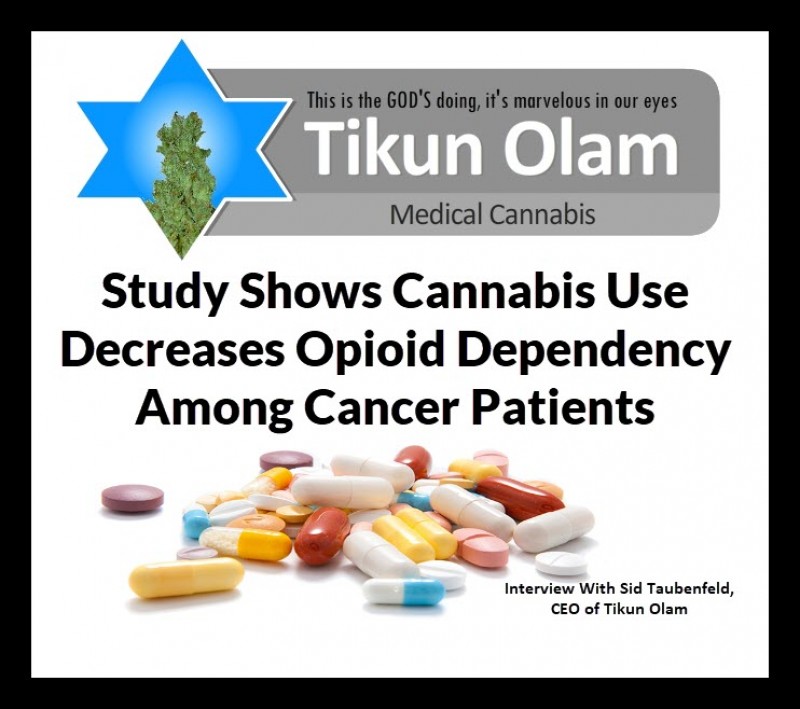Study Shows Cannabis Use Decreases Opioid Dependency Among Cancer Patients
Cancer Patients Getting Off Opioids with Cannabis - An Interview with the CEO of Tikun Olam from CannabisNet on Vimeo.
Interview With Sid Taubenfeld, CEO of Tikun Olam
Cancer is a serious public health problem. It’s the leading cause of death worldwide, with an estimated 12.7 million new cases each year in the United States alone. Up to 90% of cancer patients with advanced stage cancer go through debilitating pain, and opioids are the main treatment prescribed to mitigate the pain. However, patients report that opioids are inadequate in treating pain and they also have serious side effects, combined with the other side effects of conventional cancer therapies including chemotherapy and radiation.
Recently, researchers from Tikun Olam and partners published a study suggesting that cannabis is useful in significantly decreasing opioid dependency among cancer patients. The study, which was featured on the European Journal of Internal Medicine, found that “Cannabis is a very good alternative to reduce opioid consumption, to increase quality of life, and to reduce pain, nausea, and vomiting,” says lead researcher Lihi Bar-Lev Shleider.
Tikun Olam is the largest medical cannabis provider in Israel, a country where progressive cannabis laws have attracted worldwide attention. In Israel, MMJ patients can sign up with one of the 8 cannabis companies and are required to pay a monthly fee of around $100 no matter how much cannabis they actually need. To conduct the study, Tikun Olam collected data from 2,970 cancer patients, and the researchers assessed the impact of cannabis on the patients’ quality of life, pain levels, the symptoms of their disease, and their opioid consumption.
Over 1,000 patients took almost 4,000 different medicines combined – the most common of them were opioids, which were the “cornerstone medication for the treatment of cancer pain,” the researchers write. But by the end of the study, 36% of patients already stopped taking the opioids and 10% of them were able to reduce their doses.
To learn more about the study, Cannabis.net spoke to Sid Taubenfeld, CEO at Tikun Olam Pharma.
What are the most common opioids that are used by cancer patients? What are their side effects? These include Oxycontin, Vicodin, and Fentanyl. Their side effects are typically severe constipation, sedation, confusion, and most of all, addiction. But using cannabis can reduce the dependence on opioids. To my knowledge, there is no other study which has shown the reduction and discontinuation of opioid use with the introduction of cannabis into the therapy. We assessed about 3,000 patients and found 36% of patients were able to discontinue opioid treatment while another 10% were able to decrease their opioid dose.
Based on your findings, would you say that cannabis can improve the prognosis of cancer patients? Cannabis wasn’t used as a chemotherapeutic agent in our method. However, we found that it helps dramatically increased the quality of life for the cancer patients, other studies have shown that it also helps improve the patients’ mental status which leads to a better prognosis.
Were the patients also undergoing other forms of treatment during the period they took cannabis (chemotherapy, radiation,etc)? Yes, both chemotherapy and radiation.
Would you suggest that cancer patients continue using cannabis even after treatment? That would be up to the physician and the patient. Additionally,
What method of administration did the cancer patients use for cannabis? Would you suggest that one or two forms may be more effective? Was there also insight into the type of cannabis plant/strain that was used for the treatment of cancer? The patients in our study were administered cannabis used different methods, including smoking and sublingual drops. However, our study did not look at the effectiveness of the routes of administration.
How can cannabis support cancer patients during end-stage cancer? Our data showed that: pain intensity (1144 patients) and quality of life (1165 patients) were assessed at 6 months. Prior to the treatment with cannabis, 52.9% reported their pain to be in the range of 8-10 (with 10 as the most severe). Only 4.6 reported this intensity of pain after 6 months of treatment with cannabis. Similarly, only 18.7% reported experiencing good quality of life before cannabis treatment, while 69.5% reported good quality of life after 6 months of treatment. I would say this would support its use during end-stage cancer in improving quality of life.
Here’s a link to the full study: http://www.ejinme.com/article/S0953-6205(18)30023-2/fulltext
Study Shows Marijuana Use Decreases Opioid Dependency Among Cancer Patients from CannabisNet on Vimeo.
OTHER STORIES YOU MAY ENJOY...
WHY DO YOU HAVE AN OPIOID CRISIS? ONE GUESS. CLICK HERE.
OR..
CANNABIS STRAINS FOR OPIATE ADDICTION, CLICK HERE.







